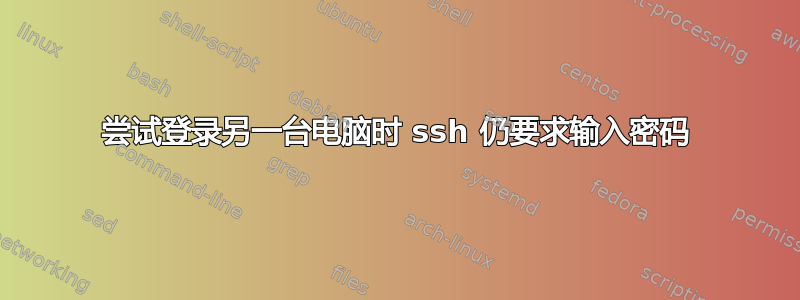
我最近用几台运行 Linux Ubuntu 12.04 LTS 的旧电脑构建了一个小型的 Beowulf 集群,并一直遵循此页面上的说明:
http://byobu.info/article/Building_a_simple_Beowulf_cluster_with_Ubuntu/
到目前为止,nfs 和 ping 其他节点都进展顺利,但现在没有密码,我无法让 ssh 工作。我花了很多时间阅读其他有类似问题的人的页面,但对他们有帮助的东西似乎都对我没用(更改为 600 模式,编辑 sshd_configure 文件等)。
最终我只是继续执行其余步骤,希望我可能只需要在执行任务时输入密码,并且如果只有一台计算机运行该任务,这确实有效(因为它要求输入 mpiuser@node1 的密码,我只需输入即可)但是,当我尝试在多个节点上运行该任务(该文档后面提到的用于测试集群的 cpi 程序)时,它(毫不奇怪)要求输入两个节点的密码,这是相同的,我输入了密码,但它就冻结了,我认为这与它的询问方式有关(它只是列出它们:mpiuser@node1 的密码: mpiuser@node2 的密码: mpiuser@node3 的密码:等等。
我甚至尝试过卸载并重新安装 ssh,但什么也没发生,ssh-keygen 命令似乎工作正常(它说出了其他人所说的一切),但之后它什么也没做。我能够使用密码让 ssh 工作,因为我发现 ssh 的默认密码是 root 密码,所以我只是更改了它,但除此之外 ssh-keygen 命令似乎什么也没做。
有任何想法吗?
- 编辑 -
打字时
"ssh -v mpiuser@node1" it says:
master@master:~$ su mpiuser
**Password:**
mpiuser@master:/home/master$ cd
mpiuser@master:~$ ssh -v mpiuser@node1
OpenSSH_5.9p1 Debian-5ubuntu1.1, OpenSSL 1.0.1 14 Mar 2012
debug1: Reading configuration data /etc/ssh/ssh_config
debug1: /etc/ssh/ssh_config line 19: Applying options for *
debug1: Connecting to node1 [192.168.0.201] port 22.
debug1: Connection established.
debug1: identity file /home/mpiuser/.ssh/id_rsa type 1
debug1: Checking blacklist file /usr/share/ssh/blacklist.RSA-2048
debug1: Checking blacklist file /etc/ssh/blacklist.RSA-2048
debug1: identity file /home/mpiuser/.ssh/id_rsa-cert type -1
debug1: identity file /home/mpiuser/.ssh/id_dsa type -1
debug1: identity file /home/mpiuser/.ssh/id_dsa-cert type -1
debug1: identity file /home/mpiuser/.ssh/id_ecdsa type -1
debug1: identity file /home/mpiuser/.ssh/id_ecdsa-cert type -1
debug1: Remote protocol version 2.0, remote software version OpenSSH_5.9p1 Debian-5ubuntu1.1
debug1: match: OpenSSH_5.9p1 Debian-5ubuntu1.1 pat OpenSSH*
debug1: Enabling compatibility mode for protocol 2.0
debug1: Local version string SSH-2.0-OpenSSH_5.9p1 Debian-5ubuntu1.1
debug1: SSH2_MSG_KEXINIT sent
debug1: SSH2_MSG_KEXINIT received
debug1: kex: server->client aes128-ctr hmac-md5 none
debug1: kex: client->server aes128-ctr hmac-md5 none
debug1: sending SSH2_MSG_KEX_ECDH_INIT
debug1: expecting SSH2_MSG_KEX_ECDH_REPLY
debug1: Server host key: ECDSA 54:0e:8b:52:4d:41:08:fe:0b:bc:95:e5:93:42:59:40
debug1: Host 'node1' is known and matches the ECDSA host key.
debug1: Found key in /home/mpiuser/.ssh/known_hosts:1
debug1: ssh_ecdsa_verify: signature correct
debug1: SSH2_MSG_NEWKEYS sent
debug1: expecting SSH2_MSG_NEWKEYS
debug1: SSH2_MSG_NEWKEYS received
debug1: Roaming not allowed by server
debug1: SSH2_MSG_SERVICE_REQUEST sent
debug1: SSH2_MSG_SERVICE_ACCEPT received
debug1: Authentications that can continue: publickey,password
debug1: Next authentication method: publickey
debug1: Offering RSA public key: /home/mpiuser/.ssh/id_rsa
debug1: Authentications that can continue: publickey,password
debug1: Trying private key: /home/mpiuser/.ssh/id_dsa
debug1: Trying private key: /home/mpiuser/.ssh/id_ecdsa
debug1: Next authentication method: password
mpiuser@node1's password:
答案1
嗯,这些行:
debug1: Authentications that can continue: publickey,password
debug1: Next authentication method: publickey
debug1: Offering RSA public key: /home/mpiuser/.ssh/id_rsa
debug1: Authentications that can continue: publickey,password
debug1: Trying private key: /home/mpiuser/.ssh/id_dsa
debug1: Trying private key: /home/mpiuser/.ssh/id_ecdsa
debug1: Next authentication method: password
告诉您服务器允许基于公钥和密码的登录,因此客户端提供 3 个公钥(id_rsa、id_dsa 和 id_ecdsa),而服务器拒绝所有这三个,因此它回退到密码认证。
如果您希望其中一个密钥能够工作,那么您需要查看服务器并了解拒绝它们的原因。查看authorized_keys服务器上的文件,确保它具有与客户端上的私钥相对应的正确公钥,并确保它具有正确的权限 - 必须由您以该身份登录的用户(mpiuser?)拥有,并且其他任何人都无法写入。
答案2
使用 ssh-copy-id 命令将公钥复制到目标服务器。删除该服务器中的 .ssh 目录。这似乎是密钥或 .ssh 目录的权限问题。让 ssh-copy-id 为您完成任务,这样就可以了。
您可以看看该命令,这是一个简单的脚本。
答案3
我终于搞明白了!原来 ssh 对整个“/home/mpiuser”文件夹存在权限问题,因此无法在任何节点上使用。我刚刚在“sshd_config”文件中将“StrictModes”编辑为“no”,现在一切正常。
感谢大家的帮助!
答案4
我遇到了与用户相同的问题。问题确实是由权限设置引起的。之前我的整个 '/home/xxx' 文件夹权限是 drwxrwxrwx (777)。之后我立即将权限更改为 drwx------ (700)。成功了!注意:假设您将公钥附加到 authorized_keys 并且“sshd_config”文件正确。
如果您有任何问题,请告诉我。:)


